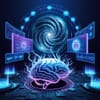Quantum computing and artificial intelligence (AI) are two of the most exciting fields in technology today. When combined, they promise to open up new possibilities that were previously beyond imagination. Quantum AI, which merges the power of quantum computing with AI algorithms, has the potential to dramatically accelerate problem-solving capabilities and transform industries ranging from healthcare to finance.
At its core, quantum computing harnesses the principles of quantum mechanics to process information in fundamentally different ways than traditional computers. Unlike classical computers, which use bits to represent data as either 0 or 1, quantum computers use quantum bits, or qubits, which can exist in multiple states at once. This property, known as superposition, allows quantum computers to perform complex calculations at speeds that are impossible for classical machines to match. When applied to AI, quantum computing could speed up the training of machine learning models, making AI smarter and more efficient.
One of the key benefits of quantum AI is its ability to tackle problems that are currently too complex for classical systems to solve. For instance, AI algorithms often require vast amounts of data to learn and make accurate predictions. As data grows exponentially, the computational resources needed to process this information also increase, creating bottlenecks. Quantum computers, with their ability to process multiple calculations simultaneously, could potentially overcome these limitations, allowing AI systems to analyze larger datasets more quickly and accurately.
In practical terms, this could revolutionize industries that rely heavily on data analysis. In healthcare, for example, quantum AI could be used to analyze medical data at unprecedented speeds, potentially accelerating the development of personalized treatments and drug discovery. In finance, it could optimize risk assessment models, detect fraud more effectively, and improve decision-making. These advancements could lead to significant improvements in efficiency, cost reduction, and innovation across many sectors.
However, there are still challenges to overcome before quantum AI can reach its full potential. Quantum computing technology is still in its early stages, and researchers are working to solve issues like qubit stability and error correction. Furthermore, integrating quantum computing into existing AI frameworks will require significant innovation and collaboration across disciplines. But despite these hurdles, the future of quantum AI looks promising. As quantum computing technology matures, it will likely unlock new capabilities that could transform how we use AI in ways we can’t yet fully predict.
In the coming years, the fusion of quantum computing and artificial intelligence could become a game-changer, accelerating the development of more powerful AI systems that can solve complex problems faster and more efficiently than ever before. The impact of quantum AI on society could be profound, ushering in a new era of innovation and discovery that enhances our ability to understand and navigate the world around us.


